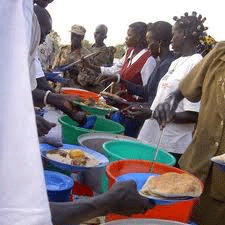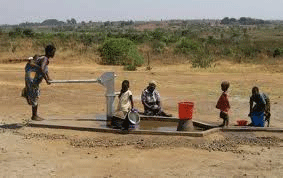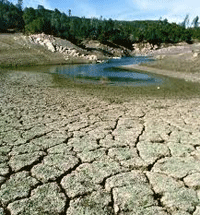DEVELOPMENT is central to the United Nation’s mission, and access to modern energy services is critical to reaching the Millennium Development Goals – whether in health care, education or poverty reduction, or to produce more food or clean water. Energy powers growth and the lack of energy inhibits it.  Imagine life as a mother without electricity. Mothers running households without electricity have to use expensive forms of energy that affect their health and take up much of their time. They rely on kerosene lamps and candles, and open fires that create constant smoke, which makes the air in the house dangerous to their health.
Imagine life as a mother without electricity. Mothers running households without electricity have to use expensive forms of energy that affect their health and take up much of their time. They rely on kerosene lamps and candles, and open fires that create constant smoke, which makes the air in the house dangerous to their health.
| ‘Energy transforms lives, businesses and economies. And it transforms our planet – its climate, natural resources and ecosystems. There can be no development without energy’ – UN Secretary-General, Ban Ki-moon |
This results in them and their children having breathing problems and puts them at risk of severe burns. In order to get firewood, they may have to walk many miles, putting them in danger of being robbed, raped or even murdered.
walk many miles, putting them in danger of being robbed, raped or even murdered.
Your life without electricity
Now imagine your life without electricity; when you start your day, what if you couldn’t turn on a light, couldn’t make a cup of coffee with the flick of a switch, couldn’t put your breakfast in the microwave? And what would you do for entertainment? There would be no television, no MP3 player, no video games, and no computer. This life would seem pretty dull and difficult; however, 20 percent of the world doesn’t have access to these modern solutions (www. millionmomschallenge.org).
Energy is life
Education
Energy is not only important at the household level, but is needed even in providing health care and education. Electricity enables students to study after dark. Realising the importance of energy, some schools in Africa and Asia have installed small wind turbines which provide light for the school at night and allows it to be used for adult education.
Health Care
Additionally, one of the most critical tools in fighting maternal death is access to electricity. Think about going into labour at night and heading to the clinic/hospital in labour to find that the medical staff is unable to help – they cannot use any medical equipment, let alone operate if needed; indeed in some parts of the world, the staff cannot even  see the patient because there is no electric light.
see the patient because there is no electric light.
Dr. Jacques Sebisaho, a doctor who runs a clinic serving a community of 250,000 people on an island in Lake Kivu, south of Goma in the Democratic Republic of the Congo, experienced firsthand the power of electricity in providing adequate health care to residents. His clinic received an easy-to-use, portable solar unit that provides health workers with efficient medical lighting and power for mobile communication, computers and medical devices. On the very first night of using the solar solution set to light the clinic, two women’s lives were saved during childbirth because the doctors could see what needed to be done.
Shortly after, the village had a cholera outbreak. For the first time in their history no one died because the nurses could see patients coming in during the night, and immediately insert IVs and provide other life- saving interventions. According to Dr. Sebisaho, approximately 60 lives were saved in the first month of having the solar suitcase.
Business
Energy can also be used to support businesses and achieve greater prosperity. A farmer who irrigates his fields can double the size of his crop, feed his family, and earn a living. A sewing machine and a light to work with at night can enable a woman to generate extra income for her family.
Although energy is regarded as being essential to human development, it is not readily available throughout the world. In fact, one in five people on the planet lack access to electricity. Twice as many, almost 3 billion, use wood, coal, charcoal or animal waste to cook meals and heat homes, exposing themselves and their families to harmful smoke and fumes. This energy poverty is devastating to human development.
All is not lost
However, all hope is not lost. Through investment and innovation in energy products, businesses can create jobs and supply millions of people with the tools they need to make a better life. Policymakers can do their part to remove legal and regulatory barriers that stand in the way of business innovation and investments. Citizens can also play their part by encouraging and supporting governments that make more sustainable choices in providing energy.
To find out more about the importance of energy to our lives, log on to http://www.sustainableenergyforall.org/
Kids Activity How many words of 3 letters or more can you make out of the words Energy Smart.
How many words of 3 letters or more can you make out of the words Energy Smart.
You can share your ideas and questions by sending letters to: “Our Earth, Our Environment”, C/O EIT Division, Environmental Protection Agency, Ganges Street, Sophia, GEORGETOWN or email us at eit.epaguyana@gmail.com.



.jpg)








